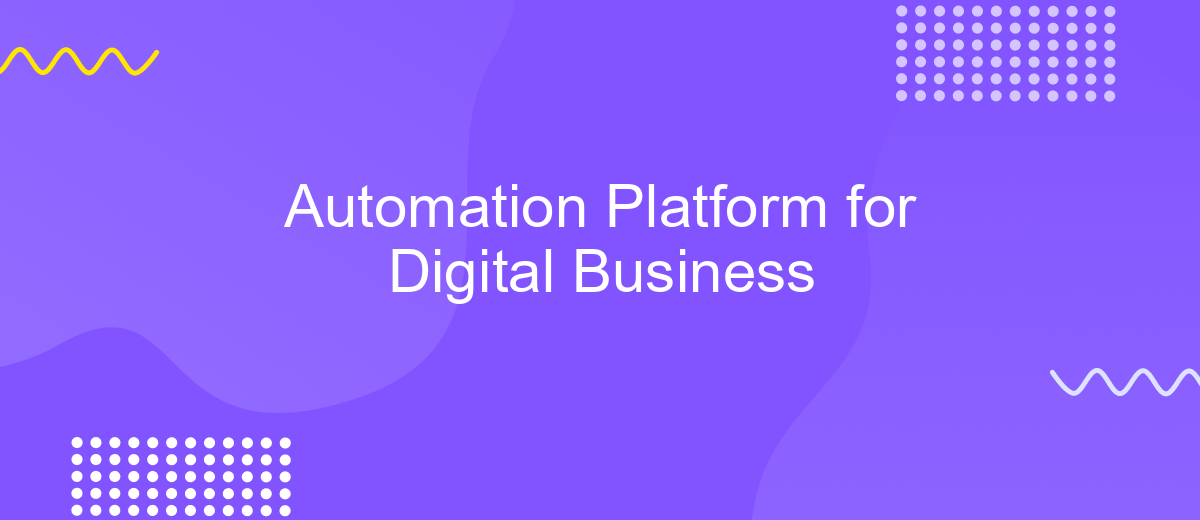Automation Platform for Digital Business
In today's fast-paced digital landscape, businesses are increasingly turning to automation platforms to streamline operations and enhance efficiency. An Automation Platform for Digital Business offers a comprehensive solution that integrates various processes, reduces manual intervention, and accelerates growth. By leveraging cutting-edge technologies, such platforms empower organizations to optimize resources, improve accuracy, and stay competitive in an ever-evolving market. Discover how automation can transform your digital business strategy.
Introduction
In today's rapidly evolving digital landscape, businesses are increasingly turning to automation platforms to streamline operations and drive innovation. These platforms are not just tools for efficiency; they are catalysts for transforming how organizations operate and compete. By automating routine tasks, companies can focus on strategic initiatives, enhance customer experiences, and accelerate growth. The integration of automation into business processes is no longer optional but essential for staying ahead in the digital age.
- Increased operational efficiency
- Enhanced customer engagement
- Scalability and flexibility
- Data-driven decision making
- Cost reduction
As digital businesses continue to expand, the role of automation platforms becomes increasingly significant. These systems not only support existing processes but also enable new business models and revenue streams. By leveraging advanced technologies such as artificial intelligence and machine learning, automation platforms provide businesses with the tools needed to adapt and thrive in a competitive environment. Embracing automation is a strategic move that empowers organizations to innovate and maintain a competitive edge in the digital marketplace.
Benefits of Automation

Automation in digital business offers a multitude of benefits, significantly enhancing efficiency and reducing operational costs. By automating repetitive tasks, businesses can free up valuable human resources to focus on more strategic activities. This shift not only boosts productivity but also improves accuracy, as automated systems are less prone to errors compared to manual processes. Furthermore, automation enables businesses to scale operations swiftly, adapting to market demands without the need for proportional increases in workforce or resources.
Another key advantage of automation is seamless integration across various platforms and services, streamlining workflows and ensuring data consistency. Tools like ApiX-Drive facilitate these integrations by providing a user-friendly interface to connect different applications without requiring extensive technical knowledge. This capability allows businesses to synchronize data effortlessly, improving communication and collaboration across departments. Additionally, automation enhances customer experience by providing faster response times and personalized interactions, ultimately leading to increased customer satisfaction and loyalty.
Components of an Automation Platform

An automation platform for digital business is a comprehensive solution designed to streamline and enhance various business processes through technology. It integrates multiple tools and technologies to provide a cohesive environment for automating tasks, improving efficiency, and driving innovation. By leveraging such a platform, businesses can optimize their operations, reduce manual effort, and focus on strategic growth.
- Process Automation Tools: These tools help automate repetitive and time-consuming tasks, freeing up human resources for more complex activities.
- Integration Capabilities: The platform should seamlessly integrate with existing systems and software, ensuring smooth data flow and communication.
- Analytics and Reporting: Built-in analytics provide insights into process performance, helping businesses make data-driven decisions.
- Security Features: Robust security measures are essential to protect sensitive data and maintain compliance with industry standards.
- User Interface: An intuitive user interface ensures ease of use and quick adoption by employees at all levels.
Implementing an automation platform requires careful consideration of business needs and objectives. Organizations must evaluate their current processes and identify areas where automation can deliver the most value. By adopting the right components, businesses can create a dynamic and agile environment that supports digital transformation and long-term success.
Applications of Automation in Digital Business

Automation in digital business is transforming how companies operate, enhancing efficiency and reducing human error. By integrating automated processes, businesses can streamline operations, leading to faster decision-making and improved customer experiences. This shift not only saves time but also allows employees to focus on more strategic tasks that require human insight.
One significant application of automation is in customer service. Chatbots and AI-driven support systems are now handling routine inquiries, providing instant assistance to customers. This technology ensures that clients receive timely responses, thereby increasing satisfaction and loyalty. Additionally, automation plays a crucial role in data analysis, offering businesses valuable insights into market trends and consumer behavior.
- Automated marketing campaigns for personalized customer engagement.
- Supply chain automation for enhanced inventory management.
- Automated financial reporting to ensure compliance and accuracy.
- AI-driven product recommendations to boost sales.
Incorporating automation into digital business strategies is not just a trend but a necessity in today's fast-paced market. As technology continues to evolve, the scope of automation will expand, providing businesses with even more opportunities to innovate and grow. Embracing these changes can lead to a competitive advantage and long-term success.
Conclusion
In conclusion, the implementation of an automation platform for digital businesses is a transformative step towards enhancing operational efficiency and scalability. By streamlining processes and minimizing manual intervention, businesses can achieve higher productivity and focus on strategic growth. The integration of such platforms enables seamless communication between different systems, fostering a more cohesive and agile business environment.
Moreover, utilizing services like ApiX-Drive can significantly simplify the process of setting up integrations, ensuring that businesses can quickly adapt to changing technological landscapes. ApiX-Drive offers a user-friendly interface that allows for the effortless connection of various applications, reducing the complexity traditionally associated with integration tasks. As digital businesses continue to evolve, embracing automation platforms will be crucial in maintaining competitive advantage and driving innovation in an increasingly digital world.
FAQ
What is an automation platform for digital business?
How can an automation platform benefit my business?
What types of business processes can be automated?
How do I integrate different applications with an automation platform?
What should I consider when choosing an automation platform?
Apix-Drive will help optimize business processes, save you from a lot of routine tasks and unnecessary costs for automation, attracting additional specialists. Try setting up a free test connection with ApiX-Drive and see for yourself. Now you have to think about where to invest the freed time and money!

